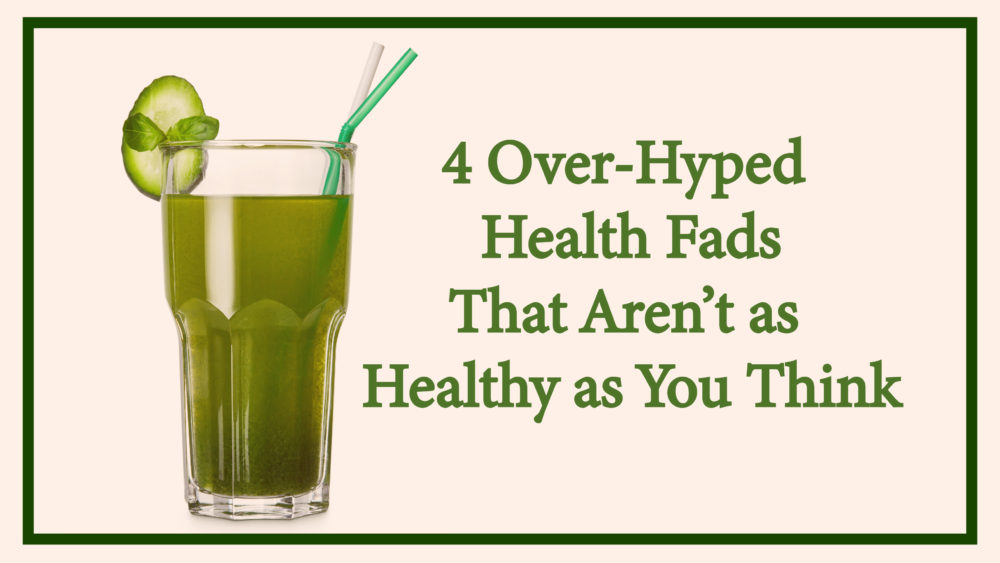When you hit a weight loss plateau, trying new ways to lose weight can be tempting. The health industry has a number of “lose weight fast” slogans attached to their products or services, many of which gain popularity quickly.
Not every health fad does just what it claims to do – in fact, many of them can be downright harmful for your health. We investigated several popular health fads that don’t live up to their expectations.
Juice cleanse
Not to be confused with a protein shake, a juice cleanse is when someone only drinks juice from fruit and/or vegetables for a short period, usually about three days. This crash diet purportedly “cleanses” the body of toxins. However, according to the Chicago-based Rush University Medical Center, this is a mischaracterization, since drinking juice doesn’t seep into your bloodstream to remove toxins. Instead, organs like the liver, kidneys, and colon naturally eliminate harmful substances.
Initially, you might lose weight on a juice cleanse because you might be consuming fewer calories. However, cutting calories that low will eventually slow the metabolism because your body won’t know when it’s getting its next meal, potentially causing weight gain. Plus, many people often binge after a short-term juice cleanse to placate their hunger.
Not getting enough nutrients from a well-balanced diet can cause a host of other health-related problems. Juice cleanses usually don’t provide sufficient protein intake, either, so while you may initially lose pounds on the scale, you may be losing healthy muscle mass.
Non-GMO foods
Genetically modified organisms (GMOs) have become controversial as a health issue because some people believe plants that have been genetically modified are unsafe to eat. As a result, many food products have begun marketing themselves as non-GMO.
However, the National Academy for Science, a US nonprofit comprised of leading researchers, concluded that GMOs are safe for human health. The College of Agriculture at Purdue University says scientists develop GMOs by testing to ensure the plants don’t provoke any new allergies. There aren’t any health benefits from non-GMOs, either; instead, farmers generally use GMOs to ease agricultural costs by lowering the use of pesticides and making foods less expensive.
Colon cleanse
Gwyneth Paltrow’s blog and online store Goop gained traction last year for advocating for a colon cleanse, which is a natural health practitioner shoots gallons of water, coffee, or herbs through the rectum. Proponents believe that colon cleansing improves health by removing toxins, boosting your energy and enhancing your immune system.
According to Michael F. Picco, M.D., there’s no evidence that colon cleansing produces these effects or is beneficial at all. In fact, colon cleansing can sometimes be harmful by causing cramping, bloating, diarrhea, nausea and vomiting. It can also cause dehydration, rectal tearing, and infections.
Hardcore fitness classes
Challenging your body is the best way to build strength and endurance, but everyone has different limits based on their athletic level. While there are benefits to exercising in a group setting like a class, many people feel pressured to do high intensity exercise for which they’re unqualified. Doing any exercise that’s too demanding has a high risk of causing injury or cardiac arrest.
Bikram yoga, which is a yoga class in a heated room to promote sweat, can be dangerous to older women or women with health conditions. CrossFit, which blends cardio and weight lifting, can be dangerous to people who are beginners to exercise and/or weight lifting.
Talk to your doctor before beginning any new exercise routine, especially a class with a high intensity.
Sources:
https://www.rush.edu/health-wellness/discover-health/truth-about-toxins
https://www.eatthis.com/juice-cleanse-effects/
https://www.medicalnewstoday.com/articles/323136.php
https://health.usnews.com/health-news/health-wellness/articles/2014/06/06/the-dangers-of-juice-cleanses
https://ag.purdue.edu/GMOs/Pages/GMOsandHealth.aspx
https://www.mayoclinic.org/healthy-lifestyle/consumer-health/expert-answers/colon-cleansing/faq-20058435



